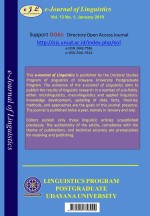An Ecolinguistics Perspectives For English Syllabus Development
Abstract
This current study was intended to develop the ecolinguistic perspective-based syllabus. The descriptive qualitative method was applied and natural phenomena were used to develop syllabus. The phenomena focused on to what extent English was mastered by learners and what learning and teaching strategies were applied. The data were obtained through test, questionnaire and direct observation for the need analysis. The State Document related to the curriculum policy was referred to in the situation analysis. The syllabus was developed based on the results of the need analysis and situation analysis and the ecolinguistic perpective-related theories. The contents of the syllabus were developed based on the following elements; they are text, context, linguistic elements, learning situation, teaching and learning activities (Kegiatan Belajar Mengajar, abbreviated to KBM) and evaluation. The content of the text was adjusted to the transactional and interpersonal functions. The context was created based on the inter-, intra-, and trans-cultural contexts of the ecological, social and ideological dimensions. KBM was prepared in accordance with the cognitive linguistic process for the language-related activities and based on the situation chosen by learners for the language production. The outcome of language performance was measured using the performance assessment system, causing the contents of the syllabus to reflect that one element was connected with another in such a way that they formed one integral language meaning.
Downloads
References
Brumfit, Christopher. 1984. Communicative Methodology in Language Teaching, the roles of Fluency and Accuracy. Cambridge University Press. Cambridge
Brown. 2005. Testing in Language Programs; a Comprehensive Guide to English Language Assessment. Mc Graw Hill
Booij, Geert. 2007. The Grammar of Words, An Introduction to Morphology. Oxford University Press. Great Britain
Bundsgaard, Jeppe. Et.all. 2012. Communicative Competences and Language Learning in an Ecological Perspective: the Triple ontexts of Participation and Language Learning from Childhood to Adulthood. Critical Literacy: Theories and Practices 6:1 2012, page 46 – 58
Chomsky, Noam. 2000. New Horizon in the Study of Language and Mind. Cambridge Unversity Press. UK
Holme, Randal. 2007. Cognitive Linguistics and Language Teaching. CPI Antony Rowe, Chippenham and Eastbourne. Great Britain.
Harmer, Jeremy. 2010. The Practice of English Language Teaching. Pearson Longman. British.
Halliday, M.A.K. 2014. Functional Grammar. Routledge. New York.
Ife, Jim. 2013. Community Development in an Uncertain World, vision, analysis and practice. Cambridge University Press.
Janda, Laura A. 2010. From Cognitive Linguistics to Cultural Linguistics. University of North Carolina and University of Tromsø
Krahnke. 1987. Approaches to Syllabus Design for Foreign Language Teaching. Printice Hall Regents, Englewood Cliffs.
Kemendikbud. 2016. Permendikbud No. 64 tahun 2016 tentang Standar Isi Pendidikan Dasar dan Menengah. Pusat Kurikulum dan Perbukuan. Balitbang. Jakarta.
Kemendikbud. 2016. Permendikbud No. 65 tahun 2016 tentang Standar Proses Pendidikan Dasar dan Menengah. Pusat Kurikulum dan Perbukuan. Balitbang. Jakarta.
Kemendikbud. 2016. Silabus Bahasa Inggris untuk SMP. Pusat Kurikulum dan Perbukuan. Balitbang. Jakarta.
Lier, Leo Van. 2004. The Ecology and Semiotics of Language Learning. A Sociocultural Perspective. Kluwer Academis Publishers. Borton.
Lier, L. Van. 2010. The Ecology of Language Learning: Practice to Theory Theory to Practice. Procedia – Social and Behavioral Sciences, 3 (2-6), 1276-1284, doi:10.1016j. sbpro. 2010.07.005 https://books.google.co.id/books?id=HkqSCgAAQBAJ&pg=PA84&lpg=PA84&dq=procedia+social+and+behavioral+sciences+3+(2010)+2-6&source=bl&ots=adqF9vVhCi&sig=HXeVp
Littlemore, Jeannette. 2009. Applying Cognitive Linguistics to Second Language Learning and Teaching. CPI Antony Rowe, Chippenham and Eastbourne. Great Britain.
Larsen-Freeman, Diane. 2011. Key Concepts in Language Learning and Language Education. In The Routledge Handbook of Applied Linguistics, edited by James Simpson, 155-170. Routledge. New York. USA.
Lwin, Soe Marlar and Rita Elaine Silver. 2014. What is the Role of Language in Education. In Language in Education Sosial Implications, edited by Rita Elaine Silver and Soe Marlar Lwin, 1-18. Bloomsbury, London.
Mulyono et al. 10.24843 The Variation of Sentence Structure in the Dyslexic Children’s Speech. e-Journal of Linguistics, [S.l.], p. 118-134, july 2018. ISSN 2442-7586. Available at:
Nunan, David. 2004. Task-based Language Teaching. Cambridge University Press. Cambridge.
O’Malley and Pierce. 1995. Authentic Assessment for English Language Learners. Longman
Palm, T. (2008). Performance Assessment and Authentic Assessment: A conceptual Analysis of the Literature. Practical Assessment, Research & Evaluation, 13 (4). Retrieved August 31, 2009, from http://pareonline.net/getvn.asp?v=13&n=4
Raharjdo, Christanto. 2016. Pendalungan : Sebuah `Periuk Besar' Masyarakat Multikultural~.Fakultas Ilmu Budaya. Universitas Jember.
http://wa-iki.blogspot.co.id/2013/08/pendalungan-sebuah-periuk-besar.html
Richards, Jack. 2001. Curriculum Development in Language Teaching. Cambridge University Press
Richards, Jack and Renendya. 2002. Methodology in language Teaching; an Anthology of Current Practice. Cambridge University Press
SABILAH, Fardini et al. Designing the Intercultural Teaching Using “Dialogic Reading” Strategies for the English Students at Primary Schools. e-Journal of Linguistics, [S.l.], p. 1-14, jan. 2018. ISSN 2442-7586. Available at:
SRI ADNYANI, Ni Luh Putu et al. Early Lexical Development and the Development of Translation Equivalents in a Simultaneous Bilingual Child. e-Journal of Linguistics, [S.l.], p. 130-148, july 2017. ISSN 2442-7586. Available at:
Stecher, B. 2010. Performance Assessment in an Era of Standards-Based Educational Accountability. Stanford, CA: Stanford University, Stanford Center for Opportunity Policy in Education.
Sanford, Daniel. 2014. Bybee’s Usage-based Models of Language. In Cognitive Linguistics, edited by Jeannette Littlemore dan John R. Tyalor, 103-116. Bloomsbury, London
Tjendani, E.N. 2016. Classroom Talk as a Classroom Management Practice at Junior High School. 6th ICEMAL Proceedings. Editor Aan Komariah., et.al. P.246-250. Atlantis Press https://doi.org/10.2991/icemal-16.2016.50How to use a DOI?
https://www.atlantis-press.com/proceedings/icemal-16/25867374
Tjendani, E.N.2017. Ecolinguistics Approach for English Learning Activities at Junior High School. Article Date Published : 30 August 2017 | Page No.: 3865-3772 | Google Scholar
DOI https://doi.org/10.18535/ijsshi/v4i8.30
https://valleyinternational.net/index.php/theijsshi/article/view/911
Tudor. 2003. Learning to live with complexity: towards an ecological perspective on language teaching https://doi.org/10.1016/S0346-251X(02)00070-2. Volume 31, Issue 1, March 2003, Pages 1-12
https://www.sciencedirect.com/science/article/pii/S0346251X02000702
Tomlinson. 2004, Developing Language Course materials, Seameo Regional Language Centre. Singapore
Tomlinson. 2012. Materials Development for Language Learning and Teaching. Cambridge University Press. Cambridge.
Yalden, Janice. 1987. Principles of Course Design for Language Teaching. Cambridge University Press.
Zhang, Jun Lawrence. 2010. The ecology of communicative language teaching: Reflecting on the Singapore experience. https://researchspace.auckland.ac.nz/handle/2292/26201

This work is licensed under a Creative Commons Attribution 4.0 International License.

This work is licensed under a Creative Commons Attribution 4.0 International License











